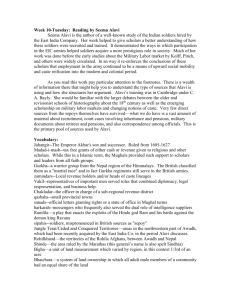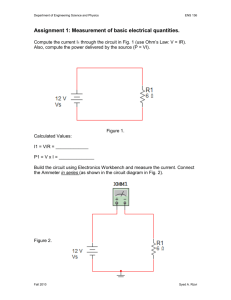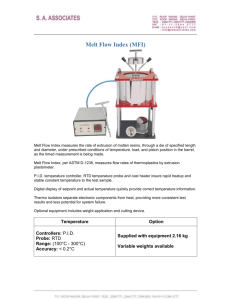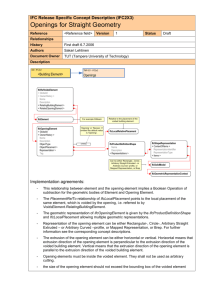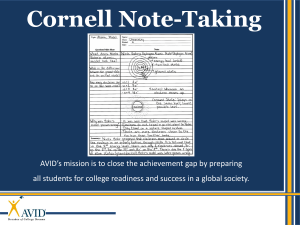USDA,s Foreign Agricultural Service (FAS)
advertisement
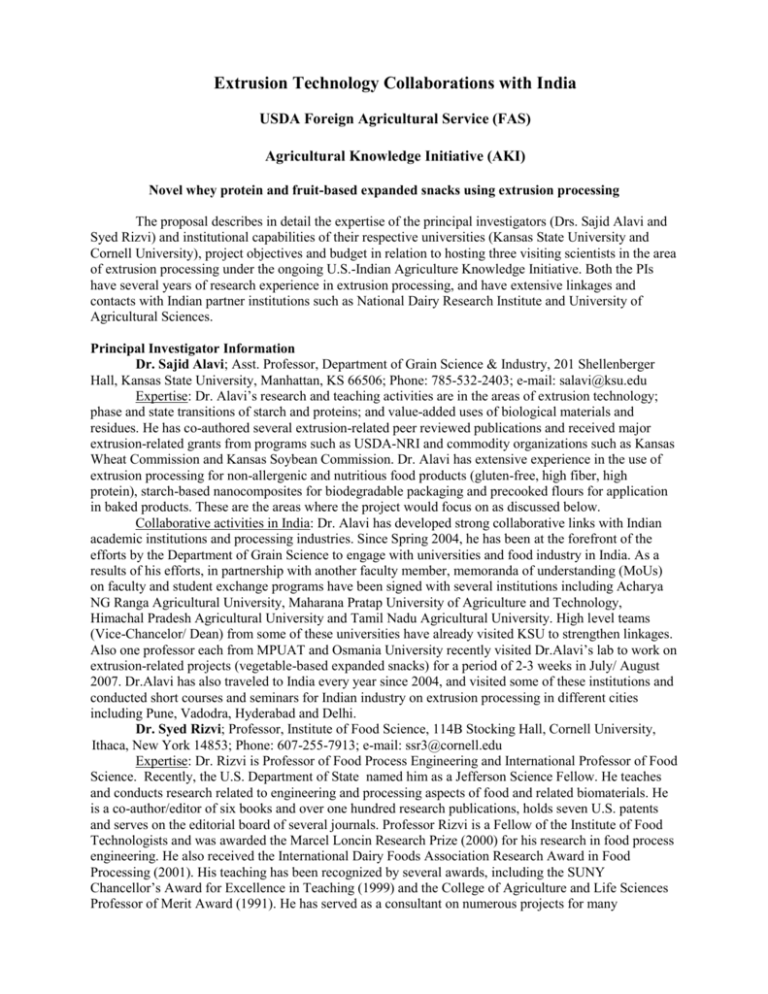
Extrusion Technology Collaborations with India USDA Foreign Agricultural Service (FAS) Agricultural Knowledge Initiative (AKI) Novel whey protein and fruit-based expanded snacks using extrusion processing The proposal describes in detail the expertise of the principal investigators (Drs. Sajid Alavi and Syed Rizvi) and institutional capabilities of their respective universities (Kansas State University and Cornell University), project objectives and budget in relation to hosting three visiting scientists in the area of extrusion processing under the ongoing U.S.-Indian Agriculture Knowledge Initiative. Both the PIs have several years of research experience in extrusion processing, and have extensive linkages and contacts with Indian partner institutions such as National Dairy Research Institute and University of Agricultural Sciences. Principal Investigator Information Dr. Sajid Alavi; Asst. Professor, Department of Grain Science & Industry, 201 Shellenberger Hall, Kansas State University, Manhattan, KS 66506; Phone: 785-532-2403; e-mail: salavi@ksu.edu Expertise: Dr. Alavi’s research and teaching activities are in the areas of extrusion technology; phase and state transitions of starch and proteins; and value-added uses of biological materials and residues. He has co-authored several extrusion-related peer reviewed publications and received major extrusion-related grants from programs such as USDA-NRI and commodity organizations such as Kansas Wheat Commission and Kansas Soybean Commission. Dr. Alavi has extensive experience in the use of extrusion processing for non-allergenic and nutritious food products (gluten-free, high fiber, high protein), starch-based nanocomposites for biodegradable packaging and precooked flours for application in baked products. These are the areas where the project would focus on as discussed below. Collaborative activities in India: Dr. Alavi has developed strong collaborative links with Indian academic institutions and processing industries. Since Spring 2004, he has been at the forefront of the efforts by the Department of Grain Science to engage with universities and food industry in India. As a results of his efforts, in partnership with another faculty member, memoranda of understanding (MoUs) on faculty and student exchange programs have been signed with several institutions including Acharya NG Ranga Agricultural University, Maharana Pratap University of Agriculture and Technology, Himachal Pradesh Agricultural University and Tamil Nadu Agricultural University. High level teams (Vice-Chancelor/ Dean) from some of these universities have already visited KSU to strengthen linkages. Also one professor each from MPUAT and Osmania University recently visited Dr.Alavi’s lab to work on extrusion-related projects (vegetable-based expanded snacks) for a period of 2-3 weeks in July/ August 2007. Dr.Alavi has also traveled to India every year since 2004, and visited some of these institutions and conducted short courses and seminars for Indian industry on extrusion processing in different cities including Pune, Vadodra, Hyderabad and Delhi. Dr. Syed Rizvi; Professor, Institute of Food Science, 114B Stocking Hall, Cornell University, Ithaca, New York 14853; Phone: 607-255-7913; e-mail: ssr3@cornell.edu Expertise: Dr. Rizvi is Professor of Food Process Engineering and International Professor of Food Science. Recently, the U.S. Department of State named him as a Jefferson Science Fellow. He teaches and conducts research related to engineering and processing aspects of food and related biomaterials. He is a co-author/editor of six books and over one hundred research publications, holds seven U.S. patents and serves on the editorial board of several journals. Professor Rizvi is a Fellow of the Institute of Food Technologists and was awarded the Marcel Loncin Research Prize (2000) for his research in food process engineering. He also received the International Dairy Foods Association Research Award in Food Processing (2001). His teaching has been recognized by several awards, including the SUNY Chancellor’s Award for Excellence in Teaching (1999) and the College of Agriculture and Life Sciences Professor of Merit Award (1991). He has served as a consultant on numerous projects for many organizations, the World Bank and UNIDO. Professor Rizvi’s research focuses on experimental and theoretical aspects of bioseparation processes, supercritical fluid extrusion, delivery systems for bioactive materials and nutrients, and physical and engineering properties of biomaterials. He also has a longstanding interest in international agribusiness development and sustainability. Collaborative activities in India: Dr. Rizvi has been at the forefront of the collaborative activities between Cornell College of Agriculture and Life Sciences (CALS) and Indian institutions and agribusinesses. He has hosted in his laboratory several visiting scientists from Indian research institutions and universities. He plays a leading role in ‘Agriculture in the Developing Nations’, the flagship course in CALS international programs, operated in collaboration with Cornell’s private-sector Indian partner, Sathguru. This course brings approximately 25 students to India from departments throughout Cornell. In India, they are joined by students from the Acharya N. G. Ranga Agricultural University, Tamil Nadu Agricultural University and the University of Agricultural Sciences. Indian students also travel to Ithaca to participate in the prerequisite activities of the course. Dr. Rizvi is also involved in the Agri/ Food Business Management Program, an executive development program, which brings together high-level policy planners, industry CEOs of the food industry, academic faculty and leaders from nongovernmental organizations from India and neighboring countries. The group is exposed first in India to the Indian perspective on agribusiness and then travels to Ithaca and upstate New York for practical experience. Host Institution Capabilities The Department of Grain Science and Industry at Kansas State University is renowned all over the world for its specialized undergraduate and graduate programs in milling science, bakery science, feed science, and bio-processing and value-added industrial applications. Dr. Alavi’s lab has both labscale (1-2 kg/hr) and pilot-scale (100-200 kg/hr) single and twin screw extruders, and ancillary processing equipment such as dryer, coater and mixer. Analytical equipment for raw material and finished product analyses include differential scanning calorimeter, phase transition analyzer, rapid visco analyzer, and texture analyzer. The department has unique and collaborative relationships with two other major institutions based in Manhattan, KS – the American Institute of Baking and USDA Grain Marketing and Production Research Center (GMPRC), and has access to various facilities at these places as well. The Institute of Food Science at Cornell University has a large, internationally recognized faculty with a broad range of expertise in all facets of food science. An excellent selection of courses in basic and applied sciences; and modern, well-equipped research laboratories and pilot plant facilities combine to make Cornell's graduate and undergraduate programs in food science among the very best in the world. Dr. Rizvi’s lab has a pilot-scale twin-screw extruder that is specially configured for low temperature and low shear processing of grain-based expanded foods using the patented supercritical fluid extrusion (SCFX) technology. Several analytical equipment such as Instron, differential scanning calorimeter, capillary rheometer and dynamic mechanical analyzer are also available in his lab. Objectives for Phase 1 Phase 1 of the project will be carried out both at Kansas State University and Cornell. The conventional steam-based extrusion facilities at KSU will be utilized to produce fruit–based expanded snacks, while the supercritical fluid extrusion facilities at Cornell University will be utilized for the developing expanded snacks fortified by milk proteins. The visiting scientists will spend two weeks each at the two institutions. They will also be taken on field trips, including one to Wenger Manufacturing, (Sabetha, Kansas), which is a major extrusion equipment manufacturer. The specific research objectives of Phase 1 are Use of corn and rice flours/ starches as base ingredients for developing nutritious extruded snacks enriched with whey proteins or dehydrated fruit powders. Chemical/ physical modification of whey proteins or fruit powders for more expansion, smoother texture and mouthfeel using alkaline treatment among other methods. Characterization of the expanded snacks from the point of view structure, texture, size and phase transition properties. Background Fiber, provided through fruits and vegetables or whole grains, has long been an important part of the human diet. Diets rich in dietary fiber provide health benefits linked to chronic ailments like cardiovascular disease and colorectal cancer (Burkitt 1971; Kantor et al. 2001; Decker et al. 2002). Dietary fiber can also reduce the risk of being overweight. However, fiber has deleterious effects on functional properties of ingredients and also the sensory perception of the food product (Artz et al., 1990). Milk whey derivatives such as whey protein isolates (WPI) are also increasingly being used in breakfast cereal and snack products (Kim and Maga 1987; Matthey and Hanna 1997; Onwulata et al. 2001). Apart from being a rich source of amino acids, such as lysine, in which cereals are deficient, whey proteins have several additional nutritional benefits, including enhancement of immune function and antioxidant activity, appetite suppression, anti-hypertension effects, greater muscle functionality and improved general health (Burrington 2004; Onwulata and Tomasula 2004). Extrusion processing is widely used to make snacks. When starch is heated and sheared at high temperatures in the presence of water in an extruder, it forms a melt that expands when the pressure is released. When whey proteins or fruit and vegetable powders are incorporated at high percentages, it negatively affects physical properties such as expansion (Kim and Maga 1987; Matthey and Hanna 1997; Chang et al., 1998; Onwulata et al. 2001; Altan et al., 2007). It is an enormous challenge to incorporate high levels of milk proteins or fruit and vegetable fiber in starch-based directly expanded snacks, while maintaining the desired expansion and textural properties. In order to produce good tasting expanded snacks by extrusion that are also healthy and high in protein or fiber, a good base formulation needs to be used and also modification of the protein or fibrous components need to be carried out to increase their processability. In the past, our research group has conducted studies on incorporation of fruits (Indian gooseberry), vegetables (lotus stem and curry leaves) and milk proteins into expanded snacks produced by conventional extrusion or supercritical fluid extrusion (SCFX) (Alavi et al. 1999). Our research group has also conducted trials on modification of fruit and vegetable fiber using NaOH for increasing their functionality. A thorough understanding is required of the starch-fiber and starch-protein interactions, and the resultant physico-chemical properties of matrices based on these components. The principal investigators propose to tackle these challenges by conducting a study involving modification, extrusion and characterization of fruit/vegetable fiber-starch and milk protein-starch based matrices. Materials and Methods Ingredients: Corn and rice flours and starches (base ingredient), dehydrated fruit powders (gooseberry and pumpkin; up to 50%) and whey protein isolate (up to 50%). Objective 1: Mixes of base ingredient and 0, 25 and 50% dehydrated fruit and vegetable powder or 0, 15 and 30% whey protein isolate will be prepared in a blender. A lab scale twin-screw extruder (Micro-18, American Leistritz) with a barrel diameter of 18 mm and L:D ratio of 31:1, high-shear screw profile and a circular die opening of 3.3 mm, will be used to process all fruit–based expanded snacks. A pilot-scale twin-screw extruder (TX-57, Wenger Manufacturing) specially configured for supercritical fluid extrusion (SCFX) will be used for to process all WPI-based expanded snacks. The extruded products will be dried at 100C in an oven before further testing as detailed in Objective 3. Objective 2: Batch preconditioning with different levels of alkali solution (5% NaOH), for softening of fruit powders, will be carried out as a separate set of treatments. For WPI, batch preconditioning with different levels of moisture will be carried out as a separate set of treatments. Treated fruit powders or WPI will be stored at room temperature for 12 hours before being mixed with the base ingredient and extruded as above. Objective 3: Extruded snacks will be characterized for quality using various physical measurements. Longitudinal and sectional expansion ratio, and piece density of products will be determined. Texture measurements will be performed using a TA.XT2 Texture analyzer or an Instron Universal Testing Machine. Uniaxial compression will be applied at a test speed of 1 mm/sec and strain level of 80%. Resulting force-deformation curves will be used to evaluate the textural parameters and the results will be reported as the average of 20 replicate measurements. Objectives for Phase 2 The visiting scientists will return to their home institutions and carry out further research work on this project including sensory and nutritional evaluation of extruded products developed in Phase 1. The PIs will also travel to India in summer 2008 to follow-up on technology transfer and continue the knowledge exchange. They will conduct an extrusion workshop for the Indian public and private sector, which will have interactive sessions for future technology transfer and trade. Registration for a limited number of members from Indian partner institutions in this workshop will be complimentary. Representatives from Wenger Manufacturing will also travel to speak at this workshop. Time Duration and Budget It is proposed to complete the Phase 1 of the above project in a 4 week period in 2008. For Phase 2, the PI’s also propose to visit the home institutions of the visiting scientists in India in summer 2008 to follow-up on the project. A total budget of $46,970.00 (including 10% institutional indirect costs) is proposed for this project. Details are provided in the supporting documents. References Alavi, S.H., Gogoi, B.K., Khan, M., Bowman, B.J. and Rizvi, S.S.H. 1999. Structural properties of protein-stabilized starch-based supercritical fluid extrudates. Food Res. Int. 32, 107-118. Artz, W.E., Warren, C.C., Mohring A.E., Villota, R. 1990. Incorporation of corn fiber into sugar snap cookies. Cereal Chem., 67(3): 303-305. Burkitt, D. 1971. Epidemiology of the cancer of the colon and rectum. Cancer, 28: 3-13. Burrington, K.J. 2004. Benefits of whey proteins in breakfast and snack foods. Cereal Foods World 49, 334-336. Decker, E., Beecher, G., Slavin, J., Miller, H.E., Marquart, L. 2002. Whole grains as a source of antioxidants. Cereal Foods World, 47: 370-373. Kantor, L.S., Variyam, J.N., Allshouse, J.E., Putnam, J.J., Lin, B.H: 2001. Choose a variety of grains daily, especially whole grains: A challenge for consumers. J Nutr. 131: 473S-486S. Kim, C.H. and Maga, J.A. 1987. Properties of extruded whey protein concentrate and cereal flour blends. Lebensm.- Wiss. Technol. 20, 311-318. Matthey, F.P. and Hanna, M.A. 1997. Physical and functional properties of twin-screw extruded whey protein concentrate - corn starch blends. Lebensm.- Wiss. Technol. 30, 359-366. McCarthy, J., O’Mahony, L., O’Callaghan, L. 2003. Double blind, placebo controlled trial of two probiotic strains in interleukin 10 knockout mice and mechanistic link with cytokine balance. Gut, 52: 975–980. Onwulata, C.I., Smith, P.W., Konstance, R.P. and Holsinger, V.H. 2001. Incorporation of whey products in extruded corn, potato or rice snacks. Food Res. Int. 34, 679-687. SUPPORTING DOCUMENTS Host Institution Budget Details - KSU Estimated duration of visit: 14 days (2 weeks) Living expenses Sub-total Professional development Sub-total Host institution fees Sub-total Ground transportation Sub-total Air transportation Sub-total Follow up activity (if applicable) Expense category Rate/person Number of persons Subtotal Lodging Per-diem (meals only) 1,050 (=75 x 14 d) 420 (=30 x 14 d) 3 3 $3,150.00 $1,260.00 Living expenses (phone, laundry, bus fares, etc.) Medical insurance 210 (=15 x 14 d) 200 3 3 $630.00 $600.00 Visa processing (includes SEVIS fees) 210 3 $630.00 $6,270.00 Educational/technical materials & supplies Field tours and site visits 250 3 Mentoring fees 750 3 $750.00 $750.00 $2,250.00 Training coordinator/ administration fees Laboratory expenses 135 3,300 3 3 $405.00 $9,900.00 $12,555.00 Local transportation $0.00 Airfare - international Airfare - domestic (if applicable) Mentor airfare - international Mentor airfare - domestic Lodging* Per-diem* Miscellaneous* Sub-total Other Direct Cornell University sub-contractual Costs costs Sub-total Total Direct Cost Indirect Cost/Overhead at 10% Total Program Cost * To be provided by Indian institutions. 500 3 1500 500 1 1 $1,500.00 $1,500.00 $1,500.00 $500.00 $2,000.00 $22,379.50 $22,379.50 $45,454.50 $4,545.45 $49,999.95 Host Institution Budget Details – Cornell University (sub-contract) Estimated duration of visit: 14 days (2 weeks) Living expenses Expense category Rate/person Number of persons Lodging Per-diem (meals only) 1,050 (=75 x 14 d) 420 (=30 x 14 d) 3 3 $3,150.00 $1,260.00 210 (=15 x 14 d) 3 $630.00 Living expenses (phone, laundry, bus fares, etc.) Medical insurance Subtotal Visa processing (includes SEVIS fees) Sub-total Professional development Sub-total Host institution fees Sub-total Ground transportation Sub-total Air transportation Sub-total Follow up activity (if applicable) $5,040.00 Educational/technical materials & supplies Field tours and site visits 250 3 Mentoring fees 750 3 135 3,300 3 3 Training coordinator/ administration fees Laboratory expenses $750.00 $750.00 $2,250.00 $405.00 $9,900.00 $12,555.00 Local transportation $0.00 Airfare - international Airfare - domestic (if applicable) Mentor airfare - international Mentor airfare - domestic Lodging* Per-diem* Miscellaneous* Sub-total Other Direct Costs Sub-total Total Direct Cost Indirect Cost/Overhead at 10% Total Program Cost * To be provided by Indian institutions. 1500 500 1 1 $0.00 $1,500.00 $500.00 $2,000.00 $20,345.00 $2,034.50 $22,379.50 Budget Justification The details of the proposed budget given below are based on costs for hosting three visiting scientists from India. Visiting scientist living expenses include costs of a hotel adjoining the KSU and Cornell campuses @$75 per day; per-diem for meals @$30 per day; miscellaneous expenses such as laundry, local taxi, phone calls, etc. @ $15 per day; $200 for a 28-day $500,000 medical insurance policy for international visitors issued by a typical company; and $210 for visa processing fees that includes $100 J1 visa application fee, $10 payment processing fee and $100 SEVIS fee. Professional development expenses include $250 per person at each host institution for a total of two field tours. One of these would be a day tour to Wenger Manufacturing, Inc., which is a major extrusion equipment manufacturer based in Sabetha, KS (about 2 hour drive from Manhattan, KS). The field trips will be undertaken by car, and the visiting scientists will be accompanied by one of the PIs. The costs include car rental, fuel and lodging expenses. Costs related to all educational/technical materials and supplies including stationery, copying expenses, provision of personal computer, etc. will be borne by the PIs at no cost to the USDA-FAS. Host institution fees include $750 for mentoring fees, $135 for administrative fees and $3,300 for laboratory expenses per person at each host institution (KSU and Cornell). The lab expenses include usage fee for pilot- and lab-scale twin screw extruders at Cornell and KSU (rates are determined by university mandated schedule of charges and includes costs for a trained operator), cost for raw materials such as starches, flours, fruit powders and whey protein isolate, and usage and consumables for analytical equipment such as differential scanning calorimeter, phase transition analyzer, rapid visco analyzer and texture analyzer. Air transportation expenses of $500 per person is budgeted for a round-trip ticket for travel between Cornell (Ithaca, NY) and KSU (Manhattan, KS). Follow up activity is proposed by the PI’s for Phase 2 of the project in the form of visits to the home institutions of the visiting scientists in India for a period of 2 weeks in summer of 2008 (June/ July). The international round trip air travel costs have been estimated at $1500 per person, and the domestic travel costs at $500 per person. Funds for lodging, per-diem and miscellaneous expenses will be borne by Indian institutions. SUPPORTING DOCUMENTS SAJID ALAVI 201 Shellenberger Hall, Kansas State University, Manhattan, KS 66506 Tel.: 785-532-2403; email: salavi@ksu.edu Education Doctor of Philosophy, 2002Cornell University, Ithaca, NY Food Science/ Food Engineering Minors: Chem. Engg.; Operations Research & Ind. Engg. Master of Science, 1997Pennsylvania State University, State College, PA Agricultural & Biological Engineering Bachelor of Science, 1995Indian Institute of Technology, Kharagpur, India Agricultural Engineering Professional Experience Assistant Professor, 2002 – present Dept. of Grain Science and Industry, Kansas State University 10% teaching, 90% research appointment; Research Areas – Food engineering; Extrusion processing of food and feed materials; Rheology; Food microstructure imaging; Structure-texture relationships Post-Doctoral Associate, 2002 Dept. of Food Science, Cornell University Research Assistant (Ph.D.), 1997 – 2001 Dept. of Food Science, Cornell University Research Assistant (M.S.), 1995 – 1997 Dept. of Agri. and Biol. Eng., Penn State National Seeds Corporation, Summer internship, 1994 New Delhi, India Teaching and Student Advising GRSC 820. Advanced Extrusion Processing. Kansas State. Fall 2004. GRSC 720. Extrusion Processing in the Food and Feed Industries. Kansas State. Fall 2002, 03 and 06 ATM 540. Introduction to Food Engineering. Kansas State. Spring 2004. ATM 541. Introduction to Food Engineering Laboratory. Kansas State. Spring 2004. Student Advising. Kansas State. 2002-current. Major advisor for 4 Ph.D. students and 1 M.S. student in Grain Science and Food Science. Advised and assisted undergraduate students for projects related to extrusion and production of starch-based biodegradable packaging foams. Student Clubs. 2004- current. Faculty advisor for the Grain Science Food Product Development Team. Honors and Awards IFT-SA Graduate Paper Competition (2001) - Honorable mention (top 6 out of 200 entrants) Best Paper Award (2000) - Food Engineering Division, Institute of Food Technologists Henry and Ruth Herzog Graduate Research Award (2000) – given for excellence in research and academics by the Department of Food Science, Cornell University Outstanding Teaching Assistant Award (1999) - Department of Food Science, Cornell University Graduate Science Exhibition Poster Award (1997) - Penn State IFT Product Development Competition, Second Place (1999) – Sweet Spots, a microwavable dessert comprising of cored apples filled with vanilla ice cream and coated with a caramel and sweet-oat veneer. ‘Discoveries in Dairy Ingredients’ Contest, Best Overall Product (2000 and 2001) - Tropical Jewels (2000), a premium frozen novelty that combines tropical fruit flavored frozen yogurt core with a fine layer of premium chocolate blended with green tea; Café Crunch (2001), an extruded snack with premium chocolate and coffee coating. Co-captain of the 7-member team. Unilever U.S. Graduate Student Award (2000) - Excellence in frozen dairy product development. Government of India National Talent Search Scholarship (1989 – 1995) Representative Professional Meeting Presentations and Abstracts Alavi, S. 2007. Extrusion processing - Adding value to cereal grains for food and industrial applications. International Conference on 21st Century Challenges to Sustainable AgriFood Systems, March 15-17, Bangalore, India. (Invited Oral Presentation) Cheng, E.M., Alavi, S., and Bean, S. 2007. Sorghum-based pre-cooked pasta utilizing extrusion processing. 25rd Biennial Sorghum Research and Utilization Conference, Jan. 14-16, Santa Ana Pueblo, New Mexico. Tang, X., and Alavi, S. 2006. Use of extrusion for synthesis of starch-nanoclay composites for biodegradable packaging films. 2006 AACC Annual Meeting, Sep. 17-20, San Francisco, CA. (Oral Presentation). Yao, N., Jannink, J., Alavi, S., and White, P.J. 2006. Properties of extruded products made from high betaglucan and traditional oat lines. 2006 AACC Annual Meeting, Sep. 17-20, San Francisco, FL. Orlando, FL. (Oral Presentation). Liu, S. and Alavi, S. 2006. Production of snack food with Moringa leaf powder using extrusion processing. 2006 Institute of Food Technologists Annual Meeting, June 23-28, Orlando, FL. Book of Abstracts. (Poster presentation). Agbisit, R.N., Cheng, E. M., and Alavi, S. 2006. Interrelationships among physical, thermal flow, microstructure and mechanical properties of extruded cornstarch-whey protein foams. 2006 Institute of Food Technologists Annual Meeting, June 23-28, Orlando, FL. Book of Abstracts. (Poster presentation). Cho, K. Y., Alavi, S., and Rizvi, S. S. H. 2006. Microstructures of steam-expanded and SCFX extrudates using 3-D non-invasive image analysis. 2006 Institute of Food Technologists Annual Meeting, June 23-28, Orlando, FL. Book of Abstracts. (Poster presentation). Gajula, H., Liu, S., Alavi, S., Herald, T., Madl, R., and Scott, B. 2006. Effect of drying method on functional properties of pre-cooked wheat flour obtained by extrusion. 2006 Institute of Food Technologists Annual Meeting, June 23-28, Orlando, FL. Book of Abstracts. (Oral Presentation). Alavi, S. 2005. Thermal Death Kinetics Models for Food Disinfection. Invited speaker for symposium on ‘Thermal Death Kinetic Models: Theory and Applications’, Entomological Society of America Annual Meeting, Fort Lauderdale, FL, Dec. 2005. (Oral Presentation). Cheng, E., Agbisit, R., Alavi, S., and Pearson, T. 2005. Mechanical-acoustic and sensory evaluations of extruded food foams. AACC Annual Meeting, Orlando, FL , Sep. 2005. (Oral Presentation). Singh, H., Bean, S., Alavi, S., and Tang, X. 2005.Use of ultrasound and extrusion processing to improve the nutritional and functional quality of sorghum flour. AACC Annual Meeting, Orlando, FL , Sep. 2005. (Poster Presentation). Agbisit, R., Trater, A.M., and Alavi, S. 2004. Understanding microstructure-texture relationships of extruded corn starch products with different protein and in-barrel moisture contents. AACC Annual Meeting , San Diego , CA , Sep 2004. (Oral Presentation). Alavi, S., and Trater, A. 2003. Microstructure characterization of biopolymer foams using non-invasive Xray tomography. Eight Conference of Food Engineering. 2003 AIChE Annual Meeting, November 16-21, San Francisco, CA. Proceedings (AIChE Pub. No. 192) p. 324-333. (Oral Presentation). Memberships Institute of Food Technologists (IFT) AACC International (AACCI); Rheology Division Chair (2006-current); Chair-Elect (2005-06); Secretary/ Treasurer (2004-05) Honor Societies - Gamma Sigma Delta (Agriculture) and Alpha Epsilon (Agricultural Engineering) Refereed Publications Cheng, E., Alavi, S., Pearson, T., and Agbisit, R. 2007. Mechanical-acoustic and sensory evaluations of corn starch-whey protein isolate extrudates. Journal of Texture Studies. Accepted for publication. Khouryieh, H.A., Herald, T. J., Aramouni, F., and Alavi, S. 2007. Intrinsic Viscosity and Viscoelastic Properties of Xanthan/Guar Mixtures in Dilute Solutions: Effect of Salt Concentration on the Polymer Interactions. Food Research International. 40: 883-893. Khouryieh, H.A., Herald, T. J., Aramouni1, F., and Alavi, S. 2007. Influence of deacetylation on the rheological properties of xanthan-guar interactions in dilute aqueous solutions. Journal of Food Science. 72(3): C173-C181. Agbisit, R., Alavi, S., Cheng, E., Herald, T.J., and Trater, A.M. 2007. Relationships between microstructure and mechanical properties of cellular corn starch extrudates. Journal of Texture Studies. 38: 199–219. Higiro, J, Herald, T.J., and Alavi, S. 2007. Rheological study of xanthan and locust bean gum interaction in dilute solution: effect of salt. Food Research International. 40: 435-447. Yao, N., Jannink, J.-L., Alavi, S., and White, P. 2006. Properties of extruded products made from high β-glucan and traditional oat lines. Cereal Chemistry. 83(6): 692-699. Lee, K.-M., Bean, S.R., Alavi, S., Herrman, T.J., and Waniska, R.D. 2006. Physical and biochemical properties of maize hardness and extrudates of selected hybrids. Journal of Agricultural and Food Chemistry. 54(12): 4260-4269 Khouryieh, H.A., Herald, T. J., Aramouni, F., and Alavi, S. 2006. Influence of mixing temperature on xanthan conformation and interaction of xanthan-guar gum in dilute aqueous solutions. Food Research International. 39: 964-973. Higiro, J, Herald, T.J., and Alavi, S. 2006. Rheological study of xanthan and locust bean gum interaction in dilute solution. Food Research International. 39(2): 165-175. Yaseen, E.I., Herald, and T.J., Aramouni, F.M., and Alavi, S.H. 2005. Rheological properties of selected gum solutions. Food Research International. 38: 111-119. Trater, A.M., Alavi, S, and Rizvi, S.S.H. 2005. Use of non-invasive X-ray microtomography for characterizing microstructure of extruded biopolymer foams. Food Research International. 38: 709719. Alavi, S.H., and Rizvi, S.S.H. 2005. Strategies for enhancing expansion in starch-based microcellular foams produced by supercritical fluid extrusion. International Journal of Food Properties. 8: 23-34. Alavi, S.H. 2003. Starch research over the years. Food Research International. 36: 307-308. Alavi, S.H., Rizvi, S.S.H, and Harriott, P. 2003. Process dynamics of starch-based microcellular foams produced by supercritical fluid extrusion. I: Model development. Food Research International. 36: 309-319. Alavi, S.H., Rizvi, S.S.H., and Harriott, P. 2003. Process dynamics of starch-based microcellular foams produced by supercritical fluid extrusion. II: Numerical simulation and experimental evaluation. Food Research International. 36: 321-330. Alavi, S.H., Chen, K.-H., and Rizvi, S.S.H. 2002. Rheological characteristics of intermediate moisture blends of pregelatinized and raw wheat starch. Journal of Agricultural and Food Chemistry. 50: 67406745. Alavi, S.H., Puri, V.M. and Mohtar, R.H. 2001. An integrated dynamic growth – finite element model for predicting the growth of Listeria monocytogenes in packaged fluid milk. Journal of Food Process Engineering, 24 (4): 231-251. Gogoi, B.K., Alavi, S.H., Khan, M., Bowman, B.J. and Rizvi, S.S.H. 2000. Mechanical properties of protein-stabilized starch-based supercritical fluid extrudates. International Journal of Food Properties, 3 (1): 37-58. Alavi S.H., Puri, V.M., Knabel, S.J., Mohtar, R.H., and Whiting R.C. 1999. Development and validation of a dynamic growth model for Listeria monocytogenes in fluid whole milk. Journal of Food Protection, 62 (2): 170-176. SUPPORTING DOCUMENTS SYED S.H. RIZVI ACADEMIC RANK: Professor of Food Process Engineering YEAR ATTAINED: 1988 ADDRESS: Institute of Food Science, 114B Stocking Hall, Cornell University, Ithaca, New York 14853-7201 CONTACT: Phone: 607-255-7913; Fax: 607-254-4868; E-mail: ssr3@cornell.edu EARNED DEGREES Ph.D., Ohio State University, 1976 M.Eng.,University of Toronto, 1988 M.S., Panjab University, 1970 B.S., Panjab University, 1968 ACADEMIC HONORS U.S. Department of State Jefferson Science Fellow, 2007 Professor of International Food Science, Cornell University, 2002- present Adjunct Professor, Department of Chemical Engineering, U. Toronto, 2002-present International Dairy Foods Association Research Award in Food Processing, 2001 First Prize for Best Business Idea, Cornell University Big Red Venture Fund, 2001 Outstanding Dairy Professional, National Dairy Research Institute Alumni, 2001 Fellow, Institute of Food Technologists, 2000 Marcel Loncin Research Prize, Institute of Food Technologists, 2000 Chancellor Medal for Excellence in Teaching, State University of New York, 1999. Professor of Merit, College of Agriculture and Life Science, Cornell University, 1991. Excellence in Teaching Award, Advisory Council, Cornell University, 1991. Ohio State University Graduate Leadership Award, 1975. Government of India Merit Scholar, 1965-1970. Panjab University and Amul Gold Medals for first positions in B.S. and M.S. Examinations. PROFESSIONAL EXPERIENCE Director of Graduate Studies Cornell University1998-2003 Visiting Professor Institute of Food Technology (Brazil)1990 Visiting Professor Bogor Agricultural University (Indonesia)1989 Visiting Professor University of Toronto1987-1988 Associate Professor Cornell University1981-1987 Assistant Professor Clemson University1977-1981 Lecturer Ohio State University1976 Graduate Assistant Ohio State University1972-1976 Management Supervisor Glaxo Laboratories1970-1972 Management Trainee Nestle's Food Specialty1968 PROFESSIONAL SOCIETIES American Association of Engineering Societies, American Institute of Chemical Engineers, American Chemical Society, American Dairy Science Association, American Society of Agricultural Engineers, Institute of Food Technologists, New York Academy of Science, World Packaging Organization, Gamma Sigma Delta, Phi Tau Sigma RESEARCH INTERESTS Engineering Properties of Biomaterials: Thermodynamic, Thermophysical, Rheological, Mechanical (Dynamic), and Structural; Mass Transfer and Phase Equilibria of biomaterials Bioseparation Processes: Supercritical Fluids, Membrane Separation (R.O., U.F., Microfiltration) Extrusion Processing with Supercritical Fluids: Generation of microcellular matrices for food and non-food applications EDITORIAL BOARD MEMBERSHIPS Journal of Food Process Engineering (1990 - 1997) Journal of Plastic and Film Sheeting (1990 - present) International Journal of Food Science and Nutrition (1992 - present) Trends in Food Science and Technology (1994- present) International Journal of Food Properties (1996-present) BOOKS Experimental Methods in Food Engineering. S.S.H. Rizvi and G.S. Mittal. VNR Inc., NY 1992. Engineering Properties of Food. 2nd ed., M.A. Rao and S.S.H. Rizvi, (eds.), Marcel-Dekker, NY, 1994. Opportunities in the Nutrition and Food Sciences. Institute of Medicine, National Academy Press, Washington, D.C. 1994. Contributing Member. Supercritical Fluid Processing of Food and Biomaterials. S.S.H. Rizvi, (ed.),Blackie Academic & Professional, London. 1994. Bioseparation Processes in Foods. R.K. Singh and S.S.H. Rizvi (eds.), Marcel-Dekker, Inc., NY, 1995. Food Process Engineering: Theory and Laboratory Experiments. S.K. Sharma, S.J. Mulvaney and S.S.H. Rizvi, Academic Press, N.Y. 1999. PATENTS Rizvi, S.S.H. and Brandsma, R.L. 2000. Microfilteration Process to Obtain Retentate for Cheese- making and permeate for Whey Proteins. U.S. Patent Application No. 09/593,770, 6/14/00 Rizvi, S.S.H., and Shukla, A. and Srikiatden 1999. A thermo-mechanical process for production of processed mozzarella cheese. U.S. Patent No. 5,925,398. July 20. Rizvi, S.S.H. and Mulvaney, S.M. 1995. Supercritical fluid extrusion process and apparatus. U.S. Patent No. 5, 417,992. May 23. Rizvi, S.S.H. and Mulvaney, S.M. 1992. Extrusion processing with supercritical fluids. U.S. Patent No. 5, 120, 559. June 9. Rizvi, S.S.H. 1985. Method and apparatus for the accelerated adjustment of water activity of foods and other materials. U.S. Patent No. 4, 543, 735. October 1. Rizvi, S.S.H. and Gossett, P.W. 1985. Gelation measuring apparatus and method. U.S. Patent No. 4, 512, 182. April 23 SELECTED REFEREED PUBLICATIONS Alavi, S.H., Gogoi, B.K., Khan, M., Brown, B.J. and Rizvi, S.S.H. 1999. Structural properties of proteinstabilized, starch-based supercritical fluid extrudates. Food Res. Int'l. 32: 107-119 Tuan, Dang Quoc, Zollweg, J. A., and Rizvi, S. S. H. 1999. Concentration dependence of the diffusion coefficient of lipids in supercritical carbon dioxide. Ind. & Eng. Chem. Res. 38(7): 2787-2793. Brandsma, R. and Rizvi, S.S.H. 1999. Deplition of whey proteins and calcium by microfiltration of acidified skim milk prior to cheese making. J. Dairy Sci. 82:2063-2069. Romero, P. K., Rizvi, S.S.H., Kelly, M. L., and. Bauman D. E. 2000. Concentration of conjugated linoleic acid from milk fat with a continuous supercritical fluid processing system. J. Dairy Sci. 83:20-22. Gogoi B.K., Alavi, S.H., and Rizvi, S.S.H. 2000. Mechanical properties of protein-stabilized, starch-based supercritical fluid extrudates. Int'l J. Food Properties 3(1);37-58. Rizvi, S.S.H. 2000. Supercritical Fluid Extraction in Encyclopedia of Separation Science. Academic Press, London. Pp 2860-2862. Kanawjia, S.K. and Rizvi, S.S.H. 2000. Utilization of MF-retentate for the Manufacture of Mozzarella Cheese. Indian J. Dairy Sci. 53(6): 411-418. Brandsma, R. and Rizvi, S.S.H. 2001. Effect of manufacturing treatment on the rheological characteristics of Mozzarella cheese made from microfiltration retentate depleted of whey proteins. Int'l J. Food Sci. Technol. 36 (6): 601-610 Brandsma, R. and Rizvi, S.S.H. 2001. Manufacture of Mozzarella cheese from highly concentrated skim milk microfiltration retentate depleted of whey proteins. Int'l J. Food Sci. Technol. 36 (6): 611-624. Vadi, P.K. and Rizvi, S.S.H., 2001. Experimental evaluation of a uniform transmembrane pressure crossflow microfiltration unit for the concentration of micellar casein from skim milk. J. Mem. Sci. 48(8): 1–14. Dogan, E., Chen, K.H., and Rizvi, S.S.H. 2001. Fundamentals and applications of supercritical CO2 extrusion technology. In: “Novel Processes and Control technologies in the Food Industry”, Bozoglu, Deak and Ray, Eds. NATO Science Series Vol. 338, IOS Press, Amsterdam, p. 37-48. Kanawjia, S.K. and Rizvi, S.S.H. 2001. Development of Paneer from microfiltered milk. Indian J. Dairy and Biosci. 11: 67-70. Solanki, G. and Rizvi, S.S.H. 2001. Physico-chemical properties of skim milk retentates from microfiltration. J. Dairy Sci. 84:2381-2391. Chen, K. J., Dogan, E. and Rizvi, S.S.H. 2002, Supercritical Fluid Extrusion of Masa-based Snack Chips. Cereal Foods World. 47(2): 44-51.
